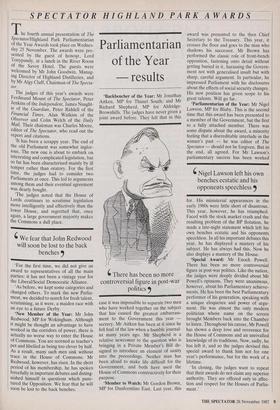SPECTATOR HIGHLAND PARK AWARDS
The fourth annual presentation of The Spectator/Highland Park Parliamentarian of the Year Awards took place on Wednes- day 25 November. The awards were pre- sented by the guest of honour, Lord Tonypandy, at a lunch in the River Room of the Savoy Hotel. The guests were welcomed by Mr John Goodwin, Manag- ing Director of Highland Distilleries, and by Mr Algy Cluff, Chairman of The Specta- tor.
The judges of this year's awards were Ferdinand Mount of The Spectator, Peter Jenkins of the Independent, James Naught- ie of the Guardian, Peter Riddell of the Financial Times, Alan Watkins of the Observer and Colin Welch of the Daily Mail. Their chairman was Charles Moore, editor of. The Spectator, who read out the report and citations.
'It has been a scrappy year. The end of the old Parliament was somewhat inglor- ious. The new one is about to embark on interesting and complicated legislation, but so far has been characterised mainly by ill temper rather than oratory. For the first time, the judges had to consider two Parliaments at once. This led to arguments among them and their eventual agreement was dearly bought.
'The judges noted that the House of Lords continues to scrutinise legislation more intelligently and effectively than the lower House, and regretted that, once again, a large government majority makes the Commons a dull place.
4 We fear that John Redwood will soon be lost to the back benches Tor the first time, we did not give an award to representatives of all the main parties: it has not been a vintage year for the Liberal/Social Democratic Alliance.
'As before, we kept some categories and changed others. To mark the new Parlia- ment, we decided to search for fresh talent, scrutinising, as it were, a maiden race with an eye to a future Derby.
'New Member of the Year: Mr John Redwood, MP for Wokingham. Although it might be thought an advantage to have worked in the corridors of power, there is actually no worse way to enter the House of Commons. You are scorned as teacher's pet and libelled as being too clever by half. As a result, many such men sink without trace in the House of Commons. Mr Redwood, however, has risen. In the short period of his membership, he has spoken forcefully in important debates and disting- uished himself in questions which punc- tured the Opposition. We fear that he will soon be lost to the back benches.
Parliamentarian of the Year results
'Backbencher of the Year: Mr Jonathan Aitken, MP for Thanet South; and Mr Richard Shepherd, MP for Aldridge- Brownhills. The judges have never given a joint award before. They felt that in this 4 There has been no more controversial figure in post-war politics case it was impossible to separate two men who have worked together on the subject that has caused the greatest embarrass- ment to the Government this year — secrecy. Mr Aitken has been at it since he fell foul of the law when a humble journal- ist many years ago. Mr Shepherd is a relative newcomer to the question who is bringing in a Private Member's Bill de- signed to introduce an element of sanity into the proceedings. Neither man has been afraid to make life difficult for the Government, and both have used the House of Commons constructively for their purpose.
'Member to Watch: Mr Gordon Brown, MP for Dunfermline East. Last year, this award was presented to the then Chief Secretary to the Treasury. This year, it crosses the floor and goes to the man who shadows his successor. Mr Brown has performed the classic role of front-bench opposition, fastening onto detail without getting buried in it, harassing the Govern- ment not with generalised insult but with sharp, careful argument. In particular, he impressed Parliament with his disclosures about the effects of social security changes. His new position has given scope to his great talents. Will go far.
'Parliamentarian of the Year: Mr Nigel Lawson, MP for Blaby. This is the second time that this award has been presented to a member of the Government, but the first to a fully attached member. There was some dispute about the award, a minority feeling that a discreditable interlude in the winner's past — he was editor of The Spectator — should not be forgiven. But in the end, all agreed. For Mr Lawson's parliamentary success has been worked 4 Nigel Lawson left his own benches ecstatic and his opponents speechless for. His ministerial appearances in the early 1980s were little short of disastrous. This year, however, he has triumphed. Faced with the stock market crash and the resulting problem of the BP flotation, he made a late-night statement which left his own benches ecstatic and his opponents speechless. In all his important debates this year, he has displayed a mastery of his subject. He has always had this. Now he also displays a mastery of the House.
'Special Award: Mr Enoch Powell. There has been no more controversial figure in post-war politics. Like the nation, the judges were deeply divided about Mr Powell's opinions. They were unanimous, however, about his Parliamentary achieve- ments. He has been the best Parliamentary performer of his generation, speaking with a unique eloquence and power of argu- ment. He was almost the only modern politician whose name on the screen brought Members back into the Chamber to listen. Throughout his career, Mr Powell has shown a deep love and reverence for the House of Commons and an unrivalled knowledge of its traditions. Now, sadly, he has left it, and so the judges devised this special award to thank him not for one year's performance, but for the work of a lifetime.
'In closing, the judges want to repeat that their awards do not claim any superior authority. They are offered only in affec- tion and respect for the Houses of Parlia- ment.'


































































 Previous page
Previous page